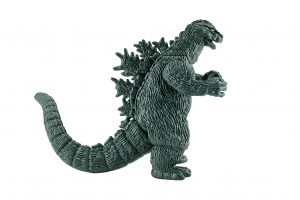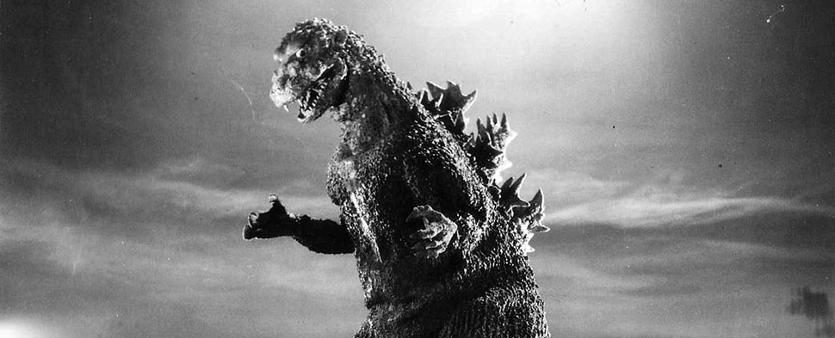From a terrifying villain to a kiddy matinee hero, Godzilla inspired one of Japan’s most revered composers. What happens when you pair the most dangerous year in a lifetime with the world’s longest running movie franchise? You get Godzilla, history’s most dangerous movie monster — with a few altruistic exceptions. Words by Crystal Hammon. Adapted from Classical Music Indy’s NOTE Magazine.
Godzilla
The original Godzilla was made by Toho Studios in Japan during the late 1940s, but the film wasn’t released until 1954, two years after the end of American occupation following World War II.
For the unindoctrinated, the anti-hero Godzilla is always portrayed as the byproduct of human failure or atrocity. In the 1954 original, the first is a franchise of 36 Godzilla films, the monster is the presumed result of the atomic bomb America detonated in 1945 against Japan. Shamed by the movie’s unveiled reference to a radioactive monster (Godzilla) bent on destroying Japan, America understood that it was being cast as a villain and prevented Toho Studios from releasing the film when it was ready.
“The Godzilla of the 1950s was bad, bad, bad,” says Michael Schelle, Ph.D., professor of music at Butler University and composer with expertise in the history of film music and Japanese music. “But Godzilla is good during the 1960s and 1970s. He is friendly, and he tries to protect Tokyo from all the other monsters that are being created by smog and air pollution. In some of the movies, you even hear the cast yelling ‘He’s here! He’s here to save us!'” After Godzilla’s good-guy era, he returns to the role of the villain and remains so in most subsequent films.
To score the music for Godzilla, Toho Studios picked Akira Ifukube, a prolific composer of concert music and music professor who taught at two different universities in Japan and became president of a third near the end of his career. “Ifukube is considered the dean of Japanese composers,” says Schelle, who authored The Score: Interviews with Film Composers. “When he got the gig for Godzilla, he sort of said, ‘Well, I’m not a film composer, but that sounds fun.'”
Ifukube built a reputation as a composer of classical compositions for orchestras and string quartets after winning first prize in a 1935 competition for young composers, but it was his pivot to film scores in 1947 that made him famous. He wrote the scores fro 300 to 400 movies, including 28 Godzilla films. The scores for more recent Godzilla films often use elements of the original Ifukube themes as nostalgic recognition of Ifukube’s work.
His ascent to fame was circuitous. Ifukube studied violin as a child and composed music as a teenager, but for many years, music was a passion pursued outside a full-time job as a forestry officer. Ironically, Ifukube only turned to music as a career after being exposed to radiation through a project he was asked to do by the Japanese Imperial Army, according to one of his online biographies.
Although it was not uncommon in Europe and Asia, very few American concert composers from Ifukube’s era were involved in film music, according to Schelle. “Aaron Copland did a couple of movie scores from the 1930s through 1950s, but most composers were in one discipline of music or the other,” he says. “Of course, there’s a lot more crossover in the past three decades, but when I was growing up as a composer, the message was still, ‘Don’t do that unless you want to sell out.’ There’s a much healthier attitude now.”
Ifukube’s Godzilla compositions follow three basic themes, recycled throughout most of the 32 Japanese-made films. One is very martial-like music any time there is a military presence on screen or when Godzilla stomps through a scene. A second motif accompanies action-packed scenes. A second motif accompanies action-packed scenes. Schelle compares the third theme to a requiem. “It’s very slow, very beautiful, very heartbreaking,” he says. “And for decades, he would use a gorgeous, slow requiem at the end when Godzilla would die, even though Godzilla always came back for another sequel.”

The lineage of ownership in the Godzilla franchise(s) is a confusing mix of players. During the early 1990s, Toho Studios sold the rights to Godzilla to Sony, resulting in a handful of disappointing, American-made films. In 2003, Toho Studios reacquired the rights, then worked out agreements that have allowed Warner Brothers and Legendary Entertainment to make Godzilla films such as the 2021 release of Godzilla vs. Kong, with music by Tom Holkenborg, a Dutch composer.
Schelle says many of the recent Hollywood scores have been underwhelming compared with the music of Ifukube and the Japanese composers who eventually replaced him. “They don’t have the personality that some of the Japanese Godzilla scores have,” he says. “When Ifukube passed the torch in the 1970s and 1980s, so often the Japanese composers that followed him would still reference those original Godzilla themes and leitmotifs — some more than others, but they would always pop up,” he says.
The reason for that, Schelle speculates, could be largely cultural: Japanese culture is one that honors elders. Ifukube was a beloved composer who received his country’s highest honor as Person of Cultural Merit before his death in 2006.
Schelle’s Movie Tip: Purchase or rent the 1954 original version of Godzilla, a beautifully remastered version made by The Criterion Collection.







Leave a Reply